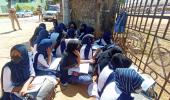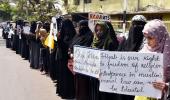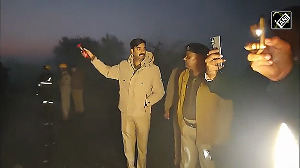'This chauvinistic attitude, what they call nationalism in the name of religion, is sad.'
'It is a tragic state that we are all in currently.'
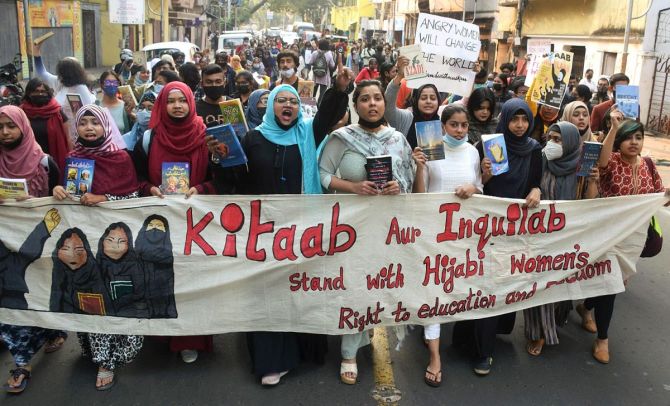
Why are Muslim women oppressed by their own families?
Why is someone fighting for the right to wear the hijab a hero and why is someone fighting against triple talaq ignored?
Why, after 75 years of Independence, does the Muslim community still not have a comprehensive personal law?
As the hijab controversy, which began in some Karnataka colleges last month, continues to grab national attention, Noorjehan Safia Niaz, an Ashoka Fellow who has founded the Bharatiya Muslim Mahila Andolan (an organisation 'that fights for the rights of Muslim women'), raises these questions.
"Is this what we are reducing our educational institutions to?" she wonders in a free-flowing conversation with Rediff.com Senior Contributor Neeta Kolhatkar.
The concluding segment of a two-part interview:
It is not easy for Muslim girls from conservative families to step outside their familial circle.
The girls who wear hijabs are battling various challenges at various levels. If they don't wear the hijab, they will be pulled out from school/college by their families.
If they wear the hijab, they are hounded by right wing youth like we saw in one of the videos making the rounds on social media.
Why is there so much pressure on Muslim girls?
I felt very sad and helpless when I saw that video.
It made me wonder what our world has come to. Is this what we are reducing our educational institutions to?
It is also symbolic of how the community is being hounded and being pushed to the wall.
This kind of chauvinistic attitude, and what they call nationalism in the name of religion, is sad.
Overall, it is a tragic state that we are all in currently.
- Hijab row: '50-50 fault with both sides'
- Hijab row: 'Don't become pawns of politicians'
- 'Why is the hijab being singled out?'
- 'You don't become Hindu by wearing saffron'
Can we hope for change?
Hope is the only thing we can hold on to. Umeed pe toh duniya qayam hai.
Hopefully, this is a phase and we can come out of it. Even Germany went through a bad time during Nazi rule. But they stepped away from their gory past, from their involvement in fascism and reconstructed their country.
I only hope it won't take us the same amount of time to do something similar.
Our deep-rooted values and the solid foundations of our Constitution has pulled us along so far.
But this (anti-Muslim) agenda is 90 years old; battling it is not going to be easy.
Why isn't the Muslim community speaking up?
We believed something like this would not happen and look at the situation we are in now.
As a Muslim women's organisation, we have worked towards reforming the law. We have also raised our voice against our own religious practices and against fundamentalism as well.
We need to introspect and see where we have gone wrong. Why have we not been able to check a practice like triple talaq for example?
What have we been doing all these decades while Muslim women are fighting battles within their own homes? Look at their vulnerability; they have no idea when they will be thrown out of their homes.
Why didn't we, as a community, stand by Shah Bano? After she secured her rights through the Supreme Court, a political party denied it to her.
To give you a historical perspective, the Hindu Marriage Act was codified in 1955 while the Hindu Succession Act, the Hindu Minority and Guardianship Act and the Hindu Adoption and Maintenance Act were codified in 1966. Even the Christians (Indian Christian Marriage Act, 1872) and Parsis (Parsi Marriage and Divorce Act, 1936) have had their laws codified.
But Muslims -- and we are 15 per cent of India's population -- still do not have comprehensively codified family law. It's been 75 years since Independence and we still do not have legislative protection against so many practices.
As a community, why have we not been not able to introspect and tackle bad practices? Why did we allow triple talaq to become an issue that the government could pick up? As a community, we could have tackled it. Why didn't we?
If you look at the historical development of Muslim law, the Muslim Personal Law (Shariat) Application Act was passed in 1937.
In 1939, the Dissolution of Muslim Marriages Act was passed.
Then, in 1978, the Shah Bano case happened. It led to the the Muslim Women (Protection of Rights on Divorce) Act in 1986 and now we have the Triple Talaq Act which was passed in 2019.
But we are nowhere close to getting a comprehensive law.
Soon, we will complete 100 years as a community living without legislative protection which -- and one should not have to say this -- is the Constitutional right of every Indian citizen. And the community will continue to use patriarchy and religion to oppress its women.
In the past, Muslim women have challenged the state's oppressive behaviour. Take, for example, the Shaheen Bagh activists or Muskan, the girl in the video who took on right wing protestors in the ongoing hijab controversy.
But when the same (Muslim) women are facing issues within their families, and are entitled to the same Constitutional rights, the same Article 14 which promises equality before the law, why is the community not supporting them?
Muskan is a hero, but someone fighting against triple talaq is not. Why is that?
Why are the five Muslim women who led the fight against triple talaq -- they went all the way to the Supreme Court -- not hailed? Why is their heroism and courage not acknowledged by the community?
This is where the hypocrisy is evident and taken advantage of by the fascist, chauvinistic regime.
What has the role of the ulema (body of Muslim scholars who act as the guardians, transmitters and interpreters of Islamic religious knowledge) been in all these years?
The ulema had a strong hold over the community for several decades.
That kind of religious leadership had the state's backing and this was seen in the way the late Rajiv Gandhi buckled under pressure and allowed Muslim women to be overpowered despite the judgment in their favour; it was a 'You scratch my back and I'll scratch yours' understanding.
The ramifications of this behaviour lasted several decades and successfully drowned out the voices of Muslim women.
We all know how the late Dr Asghar Ali Engineer (the social activist and writer who raised his voice against communalism and communal violence) was hounded when he spoke about Islam and the rights of Muslim women.
Whenever my organisation speak about Muslim women and the issues they face, we are called stooges of the RSS and the BJP. We are questioned as to why we are allowing ourselves to be used by the government against our own community.
Nobody speaks about reforms needed in the community.
Every time we raise these issues, we are told it is not the right time to speak about it. When we issued a statement on the hijab controversy, we were told not to muddy the waters, that it is not a good time.
My question is: When will the time be right to raise these kinds of questions?
India has been independent for 75 years; in another 25 years, it will complete a century as a democratic nation whose Constitution guarantees equality in the eyes of the law. Yet, Muslim women continue to be denied their Constitutional rights and the right to equality within the family.
So, once again I want to ask, when will this right time come? And who will decide that the time is right?
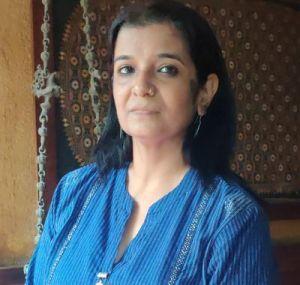 IMAGE: Noorjehan Safia Niaz. Photograph: Neeta Kolhatkar
IMAGE: Noorjehan Safia Niaz. Photograph: Neeta KolhatkarWhat is the way ahead?
We must keep the discussion about our weaknesses and our issues alive. We must find a way to end this hypocrisy and bring in democracy within ourselves.
We must deal with our issues within our own community and not lay them on a silver platter for the other side to use against us.
What is happening in Karnataka is unconstitutional; they are depriving girls of their right to education.
How can you not allow your students to enter the campus? You cannot set one section of students against another.
Don't forget, the students are your children.
Feature Presentation: Aslam Hunani/Rediff.com



